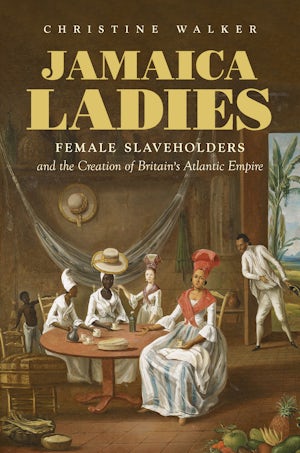Published by the Omohundro Institute of Early American History and Culture and built upon painstaking and wide-ranging archival research across Britain, Jamaica, and the United States, Jamaica Ladies struck the committee as a tour de force. Walker focuses on free and freed women of European, Euro-African, and African descent who inhabited this island in the first century after it came under English rule and offers a complex, multifaceted portrait of their activities as colonizers and slaveholders with the broader aim of exploring “the gendered dimensions of power” in the Anglo-Atlantic world. She examines Jamaica’s first century under English rule, as slavery expanding rapidly across the British Atlantic colonies, and her most compelling insights derive from a seemingly forgotten pile of testamentary devices housed in the Jamaican archives. It may be that Walker has analyzed every will penned by property-holding women in Jamaica during her period of study. The granularity of the lived experiences that Walker carefully pieces together from these terse and fragmentary legal records, as well as from a rich assortment of mercantile and personal correspondence, enables her to make a compelling case that these women were “handmaidens of empire.”
Walker thus challenges the conventional renderings of the British Caribbean as “a hypermasculine space,” and implicates its titular subjects in the building of Britain’s largest and wealthiest slaveholding colony. The activities of these Jamaica Ladies are surveyed in the first three intricately wrought chapters of the book, situated respectively in Port Royal, urban Kingston, and the plantations of the rural parishes. Transported to these colonial spaces, the reader finds free and freed women playing critical roles as proprietors and managers of plantations and businesses as well as households, forging links in imperial commercial networks and structuring everyday life in the colony’s ports and backcountry. In so doing, Walker makes indelibly clear, these propertied women both contributed to and profited from the exploitative extraction, brutal discipline, and deadly violence that marked this slave society.
The complicated interplay between gender, race, sex, and power is even more brilliantly illuminated in a second set of chapters which explore the socio-legal practices of inheritance bequests, nonmarital relationships, and manumission. Following the paper trails left behind by her historical subjects with an acute grasp of the legalities of colonial life, Walker vividly demonstrates the gendered nature of slaveholding – the distinctive dynamics, as well as the intimacies and animosities that developed between female enslavers and the men, women, and children they acquired as property and sometimes incorporated into their own families and wider kinship networks. The accumulated details of these everyday interactions between owners and captives add up to far more than the sum of their parts, persuasively illustrating how women’s possession of other people enhanced their own sovereignty, enabling them to command more wealth and independence than their counterparts in other parts of the British Empire. And yet the relatively autonomous actions of these female slaveholders did not always or only operate to strengthen the institution of slavery in the Anglo-Atlantic world. They also exposed strains and contradictions in the gender and racial hierarchies that were supposed to govern colonial life, strategically “creating loopholes for a select few to escape bondage” that threatened to “collapse the boundaries between enslavement and liberty.” In this way, Walker’s careful analysis of the role of women property holders helps reduce the historiographical division between studies of the West Indies and the rest of British America. Indeed, Walker’s analysis offers a model for rethinking who used law to build the empire, how they did so, and to what ends.
In providing this provocative and persuasive account of the world these female slaveholders helped make, Walker makes a significant contribution to the field of American legal history. Though focused on a British colony that did not become part of the United States, her analysis of how women used wills and their management of property and households and the people in them sheds new light on the roles of law and gender in slaveholding society more generally. Skillfully tacking between legislative codes and surviving wills, inventories, deeds, and other documents that were not originally written for the benefit of historians, Walker exhibits a deep appreciation of what these paper records can and cannot tell us about the society within which they were created. The historical narrative she crafts from these materials is nothing short of revelatory, bringing to light the mixed motives, ideals, and interests that free and freed women brought to the work of building “a brave new world, one that hinged on relentless profit-seeking, coercive colonialism, and profound exploitation.” And because this is a past that is not even past, her book has much to teach us about the dilemmas of our own timesCongratulations to Professor Walker!
-- Karen Tani
